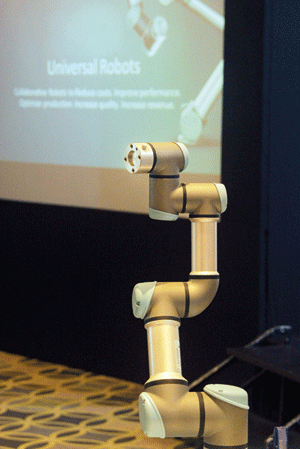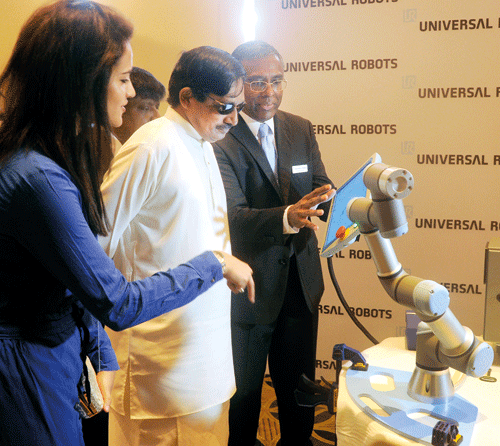Forget Armageddon, the machines can make omelettes too

A robot. Pix by Amila Gamage
The pitch was quite simple – if Sri Lankan manufacturing companies want to raise productivity levels by as much as 85 per cent, then it is time to go for a Universal Robot. This is not a technology start-up in the true sense of the word, having been around since 2005. But in Sri Lanka Cobots, short for Collaborative Robots, can be considered as such especially as it transforming the world and the workplace. Pradeep David, General Manager of Universal Robots, urged Sri Lankan businesses to jump on the bandwagon with this advanced, and at the same time quite easy to use, automation process.
A persuasive speaker, Mr. David was adamant that life would become richer, literally, for companies who took the step to man their factory floors with these cobots. Already five local companies, mostly in the garment trade, are talking to the Bengalaru-based regional office which he heads.
Founded in 2005 in Odense, Denmark by three Danish students – they were researching how industrial robots can help automate food processes in the food and beverage industry – Universal offers user-friendly and affordable robots (prices range from Rs. 2.5 million to Rs. 5 million for the three types of robotic arms, the UR3, UR5 and UR10 handling payloads up to three, five and 10 kilograms).
“In a developing economy like Sri Lanka, automation in every field will enhance production and with Cobots companies will be able to enhance productivity levels by 85 per cent. We are delighted to be able to provide the platform required for the Sri Lankan market for increasing productivity, quality and market competitiveness,” said Mr. David speaking at the launch on Thursday. Perish the thought that this is only meant for boring repetitive tasks on the factory floor. Cobots can be used for a variety of out-of-the-box tasks, from making dosai and omelettes (in Singapore) to making cocktails behind a bar in the Netherlands.
“They can be used for a wide range of functions like doing the lighting at fashion shows, making coffee, surgical procedures or even for physiotherapy and sports therapy procedures,” outlined Mr. David. Among its global clientele are BMW, Volkswagen, Siemens, General Electric, Calvin Klein, Johnson and Johnson. In India, one of Universal Robot’s biggest customers is Bajaj, which started using cobots in 2010, and now have 100 of them in the manufacturing process of its motorcycles. The image of the Universal Soldier – featuring Brussel’s beefcake Jean Claude van Damme – was flitting through my mind as I walked into the launch of the cobots at the newly refurbished Hilton Hotel.

(From Left) -- Richa Misri - Head of Marketing Universal Robots Sri Lanka and India, State Minister for Industry and Commerce Champika Premasa and Pradeep S. David - General Manager India Universal Robots.
There was no menacing robotic figure standing in The Blue room, rather one multi-faceted robotic arm clamped on to a desk. “This is the beauty of this cobot. All you need is to unscrew four bolts and you can take it to another place on your production line, clamp it and use it for another different task. And you don’t need a highly paid programmer to operate it, anyone can do it, after a five-minute lesson,” says Mr. David proudly.
A demonstration is done for Champika Premadasa, State Minister of Industry and Commerce. It is brief for the Minister has other pressing engagements, and after a short speech, he makes his exit. It is left to the rest of us to hear how great Universal Robot is.
A recent survey revealed that the global cobot market is set to grow from US$116 million last year to US$11.5 billion in the next 10 years. Richa Misri, the marketing head for the Indian operation provides a more enticing figure – the ROI in India is just under two years. “But one of the proudest aspects is that MIT has rated Universal Robots as the world’s 25th smartest company. We are a small company but one which is extremely innovative,” she said. “The concept most people have of a robot in industry is that it is large and has to be fenced off (so as to avoid accidents) but ours is totally different. It is not just a piece of machinery, but together with its human partner, acts like a third arm.
Also when you come into contact with it, it stops automatically so there is no danger of accidents,” Mr. David says. So what about job losses? Will machines take over from man one day? David laughs and says the Terminator myth is pure pulp fiction. “This is a question which is commonly asked – don’t robots take jobs away from people. What takes jobs away from people is poor quality and standards. If your company is not efficient, then you have to close down and lay off your workforce. “There was a company which was making lenses for people with eye problems. This is a precision job and it took a long time with only 150 lenses being made a day under human labour.
When cobots were introduced this increased to 10,000 lenses. From employing just 10 people this company now employs 800. Jobs are created when you make your company efficient,” Mr. David pointed out. “A cobot is the best of both worlds, you have a human who can think and a robot who can do repetitive and mundane tasks with precision,” he added. South Korea has the highest density of robots per 10,000 people – 470 – followed by Japan and Germany. Asian powers China and India are way down the list according to Mr. David. Sri Lanka is not even in the picture. “The potential is huge for cobots for it can be used in any area.
As the name suggests, it is a technology upgrade from industrial robots and are designed to work safely with humans. “For a country like Sri Lanka which is looking to fast-track its development and at the same time adopt cost effective, yet efficient technology, cobots is the right way to go especially for small and medium-sized enterprises,” he said. “We are not quite at the stage (as in the West) where you can get the cobots to make pancakes like a celebrity chef, but this will happen soon,” he added. Forget Armageddon and machines taking over. If you can have a Michelin-style meal served up when you come home after work, then cobots are the way to go.


